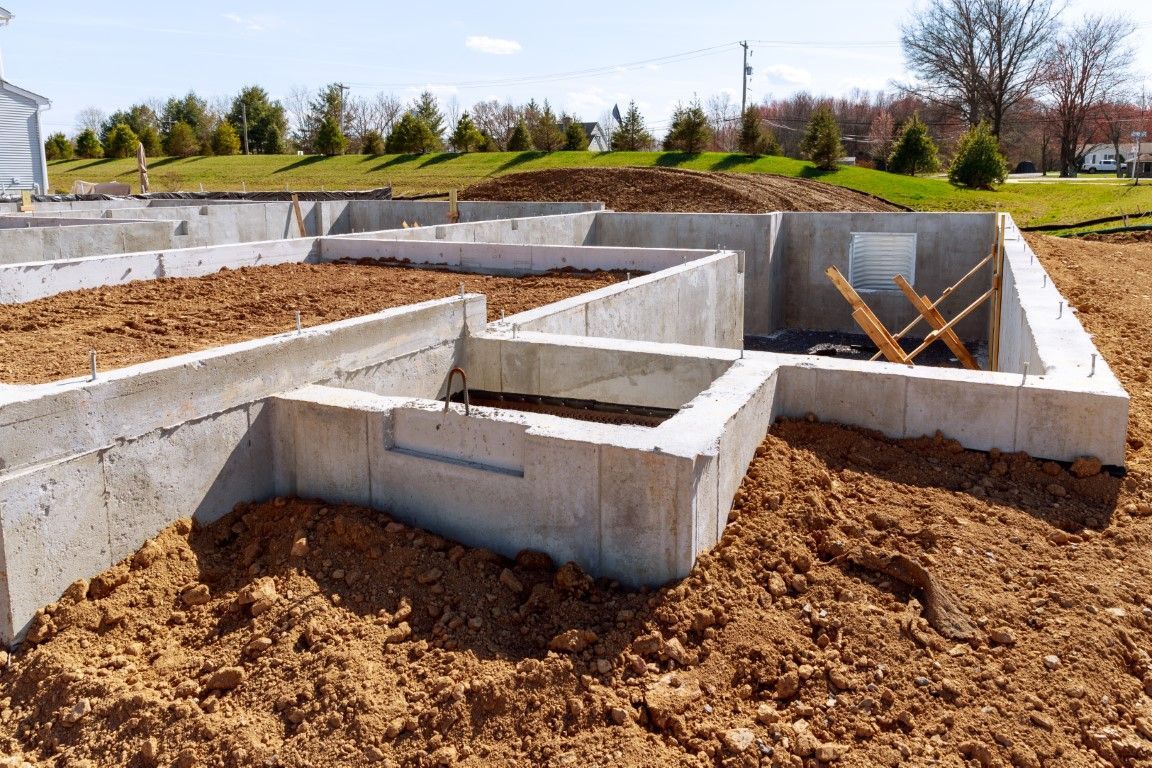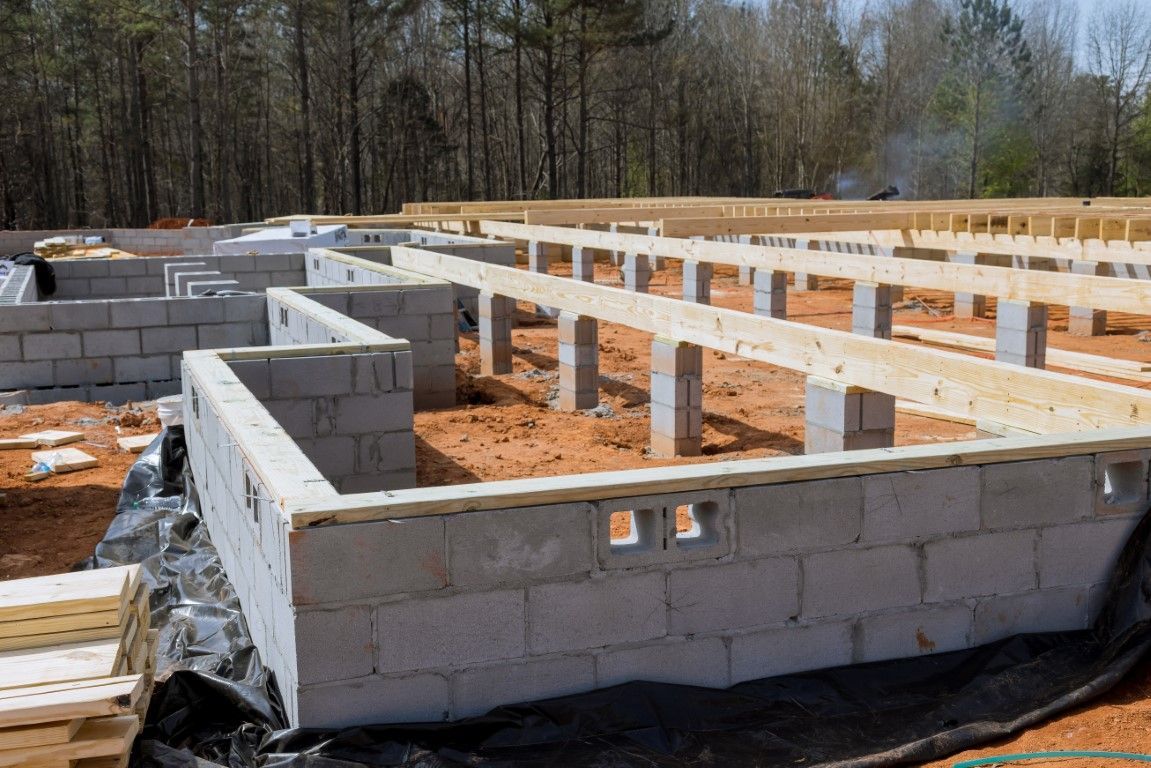Concrete Pros Kingman
(928) 563-5777
Concrete Foundations
in Kingman AZ
Concrete foundations serve as the backbone of any construction project. They provide stability and support, ensuring the structure can withstand various environmental factors and loads. A well-constructed foundation prevents issues such as settling, shifting, and cracking, which can lead to costly repairs down the line. The climate can be extreme, the quality of a foundation becomes even more crucial. A sturdy concrete foundation helps keep homes and buildings secure, offering peace of mind to property owners.
Shallow Foundations
Shallow foundations are often used for lighter structures. They are typically placed just below the surface, resting on soil that is strong enough to support the weight of the building. Common types of shallow foundations include spread footings and slab-on-grade foundations. The choice of shallow foundation can depend on the soil type, the load of the structure, and local building codes. These foundations are generally easier and quicker to construct, making them a popular option for residential projects.
Deep Foundations
In contrast to shallow foundations, deep foundations are used for heavier structures or in areas where the surface soil is not stable enough to support the weight of the building. Deep foundations extend deeper into the ground to reach more stable soil or bedrock. Common types include piles and drilled shafts. The use of deep foundations may be necessary, especially when constructing larger commercial buildings or homes on sloped land. These foundations help distribute the weight of the structure evenly, ensuring long-term stability.
The Construction Process
The construction of a concrete foundation begins with site preparation, which involves clearing the area and ensuring proper drainage. Once the site is ready, excavation is performed to create space for the foundation. The next step is to form the foundation using wooden or metal frames to shape the concrete. Reinforcement, such as steel rebar, is often added to enhance strength. After the concrete is poured, it is allowed to cure, which is a crucial phase for achieving maximum strength and durability. The entire process requires careful planning and execution to ensure the foundation meets all structural requirements.
Regular Inspections
Regular inspections of concrete foundations are essential for maintaining their integrity over time. These inspections can identify early signs of issues such as cracks, moisture intrusion, or uneven settling. Property owners should schedule routine inspections, especially after extreme weather events or seismic activity. Catching potential problems early can save significant repair costs and prolong the lifespan of the foundation.
Repair Techniques
When foundation issues arise, prompt action is necessary. Various repair techniques can address different problems. For minor cracks, filling with epoxy or polyurethane can be effective. For more significant issues like settling, underpinning methods such as piering or slab jacking may be required. Each repair method has its own benefits and suitability depending on the nature of the damage. Consulting a professional is critical to determine the best approach for any foundation repair.
Protective Measures
To enhance the longevity of concrete foundations, several protective measures can be implemented. Proper drainage around the foundation is vital to prevent water accumulation, which can weaken the structure. Installing gutters and downspouts directs rainwater away, while landscaping should slope away from the foundation. Additionally, applying sealants can protect the concrete from moisture penetration and freeze-thaw cycles, which are especially important in Kingman's fluctuating temperatures.
Benefits of Concrete Foundations
Concrete foundations offer numerous benefits, making them a preferred choice in construction. They are durable, capable of withstanding heavy loads, and resistant to pests like termites. Concrete is also fire-resistant, adding an extra layer of safety to structures. Additionally, they provide excellent insulation against temperature fluctuations, contributing to energy efficiency in buildings. Overall, the investment in a concrete foundation pays off in terms of safety, longevity, and reduced maintenance costs.
When to Consult a Foundation Specialist
Knowing when to consult a foundation specialist is key to maintaining a safe and stable structure. Signs that indicate professional help may be needed include significant cracks in walls or floors, doors that stick or fail to close properly, and uneven floors. If you notice water pooling around the foundation or signs of moisture inside the home, it's essential to seek advice. Foundation specialists can provide expert assessments and recommend the best course of action to ensure the integrity of your foundation.
If you’re considering a
concrete foundation in Kingman, AZ, or if you need expert advice about foundation issues, we are here to help. Our experienced team specializes in concrete foundations, offering services tailored to meet your needs. Don’t wait until small problems become significant issues; reach out to us today to schedule a consultation. Let us help you build a strong and reliable foundation for your future.
Concrete Services For Residential and Commercial Property Owners
How Weather Affects Your
Concrete Foundation: Tips for Protection
Your concrete foundation is crucial for the stability and safety of your home. It supports the entire structure, so keeping it in good condition is vital. However, various weather conditions can impact its strength and durability. Understanding how weather affects your concrete foundation can help you take proactive measures to protect it.
-
Rain and Moisture
Excess moisture from heavy rains can weaken your concrete foundation over time. Water can seep into small cracks, expanding and contracting as temperatures change, which can worsen damage. To protect your foundation from rain, ensure proper drainage around your home. Gutters and downspouts should direct water away from the foundation. Additionally, consider installing a French drain or a sump pump if you frequently face flooding issues.
-
Snow and Ice
Snow and ice can also pose serious risks to your concrete foundation. As snow melts and refreezes, it can create pressure that leads to cracks and shifts in the foundation. To mitigate this, clear snow away from the foundation as soon as possible. Using a roof rake can help prevent ice dams from forming at the edge of your roof, which can direct excess water toward the foundation.
-
Extreme Temperatures
Concrete is susceptible to changes in temperature. In extreme heat, concrete can expand, while in cold temperatures, it contracts. This constant shifting can cause stress and lead to cracks. To reduce the impact of temperature changes, consider using insulation around the foundation. Additionally, applying sealants can help protect the concrete from moisture and temperature fluctuations.
-
Drought Conditions
While it may seem counterintuitive, dry weather can also damage your concrete foundation. When soil dries out, it can shrink, leading to settling and cracking of the foundation. To protect against this, maintain consistent moisture levels in the soil around your home. This can be achieved by regularly watering the landscape and ensuring proper irrigation systems are in place. Avoid overwatering, as this can lead to other issues, such as excess moisture.
-
Wind and Storms
High winds can carry debris that may strike and damage your foundation. Severe storms can lead to erosion, which can undermine your foundation's stability. To protect against these elements, regularly inspect your yard for loose branches or debris and trim any overgrown vegetation. Consider reinforcing your home’s exterior with storm-resistant materials, especially in areas prone to severe weather.
-
Regular Maintenance
Regular inspection and maintenance are key to protecting your concrete foundation from weather damage. Look for cracks, discoloration, or signs of water pooling near the foundation. Address any issues promptly, as small problems can escalate into larger repairs if left unattended. Additionally, consider sealing your foundation every few years to provide an extra layer of protection against moisture.

Protecting your concrete foundation from the elements is crucial for the long-term stability of your home. By following these tips, you can help ensure that your foundation remains strong and resilient. If you have concerns about your concrete foundation or need professional assistance, don’t hesitate to contact us today. Our experienced team is here to help you safeguard your home against weather-related issues.
Foundation Failures: Common Issues and How to Prevent Them
A strong foundation is crucial for any building, whether it’s a home, office, or commercial space. It bears the weight of the entire structure and provides stability. However, over time, various factors can lead to foundation failures, resulting in costly repairs and safety risks. Understanding these common issues and how to prevent them is essential for maintaining the integrity of your property.
-
Soil Movement
Soil movement is one of the leading causes of foundation problems. It can occur due to changes in moisture levels, soil type, or weather conditions. For instance, expansive clay soil can swell when wet and shrink in dry conditions, exerting pressure on the foundation.
Prevention: To mitigate this issue, ensure proper drainage around your property. Install gutters and downspouts that direct water away from the foundation. Additionally, consider landscaping techniques that minimize water pooling near the base of your structure.
-
Water Damage
Excessive moisture can weaken the foundation. Water intrusion can lead to soil erosion, mold growth, and deterioration of building materials. Poorly designed drainage systems or plumbing leaks can exacerbate this problem.
Prevention: Regularly inspect and maintain your plumbing systems. Make sure to repair leaks promptly. Consider installing a sump pump in basements or crawl spaces to prevent flooding. Additionally, ensure that your drainage systems are functioning correctly to divert water away from the foundation.
-
Poor Construction Practices
Sometimes, foundation issues stem from poor construction methods or the use of substandard materials. If a foundation isn’t built to code or lacks adequate support, it may fail over time.
Prevention: When building or renovating, always hire qualified professionals. Ensure that they follow industry standards and local building codes. Investing in quality materials and skilled labor can save you from significant headaches later.
-
Tree Roots
Trees can provide shade and beauty, but their roots can pose a serious threat to foundations. As roots grow, they can shift soil and even penetrate foundation walls, leading to cracks and structural issues.
Prevention: Plant trees at a safe distance from your home. Regularly monitor the growth of nearby trees and consider removing those that pose a risk to your foundation. If a tree's roots have already started to cause damage, consult a professional for advice on remediation.
-
Cracks and Settling
Cracks in walls or floors often indicate foundation settling. While some settling is normal, excessive or uneven settling can lead to severe problems. Cracks can widen and create further structural issues if not addressed.
Prevention: Regularly inspect your property for cracks or signs of settling. If you notice any changes, contact a foundation specialist. They can assess the situation and recommend appropriate measures to stabilize your foundation.
-
Climate Change and Natural Disasters
In recent years, climate change has led to more severe weather events, including heavy rains, floods, and droughts. These conditions can strain foundations, making them more susceptible to failure.
Prevention: Stay informed about local weather patterns and prepare your property accordingly. Invest in flood barriers if you live in a flood-prone area, and ensure your drainage systems are up to date. Regularly review your insurance policy to make sure you’re covered for natural disasters that may impact your foundation.

Foundation issues can lead to significant damage if not addressed promptly. Understanding the common problems and implementing preventive measures can help you maintain a strong and stable foundation. If you suspect any issues with your foundation or need assistance with inspections and repairs, don’t hesitate to reach out to us. Our team of experienced professionals is here to help you ensure the safety and longevity of your property. Contact us today for a consultation!
COMPANY INFO
QUICK LINKS
LET'S WORK TOGETHER!
At Concrete Pros Kingman, we’re excited to partner with you to create stunning and durable concrete solutions. Contact us today to discuss your project and bring your vision to life!